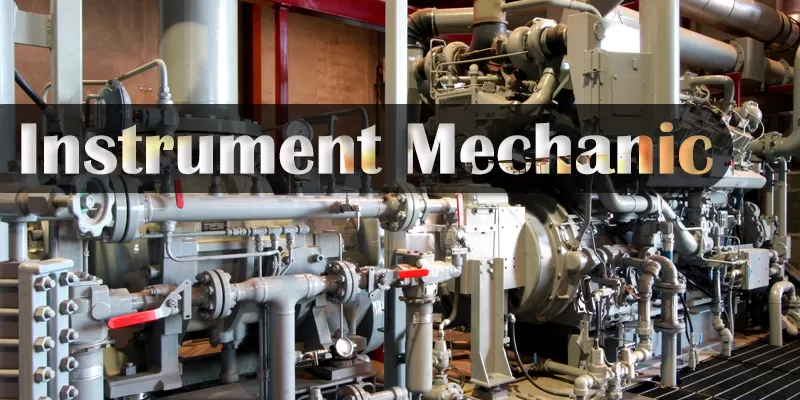
ITI Trade: Instrument Mechanic
Powered by NCVT
The Instrument Mechanic trade under NCVT (National Council for Vocational Training) is a job-oriented program designed to meet the demands of Indian and international industries. This trade prepares candidates for government jobs, private sector employment, and self-employment in the field of precision instruments, automation, and industrial control systems.
This course is structured to provide in-depth training in repairing, assembling, calibrating, and maintaining a wide range of mechanical, hydraulic, pneumatic, electrical, and optical instruments used in industries.
Course Overview
An Instrument Mechanic is responsible for testing, repairing, and overhauling various precision instruments to ensure efficient performance. The work involves analyzing defects, dismantling components, calibration, electrical connections, and ensuring instruments meet industry standards.
This trade is essential for industries like:
🔹 Manufacturing
🔹 Automobile
🔹 Power Plants
🔹 Aerospace
🔹 Process Control Industries
🔹 Automation and Robotics
Graduates gain hands-on skills in instrument maintenance, functional testing, calibration, mechanical fitting, and digital measurement techniques.
Scope of Employability
After successful completion, candidates can work in:
✅ Government organizations (Power Plants, Defense, Railways, PSU, etc.)
✅ Private industrial sectors (Manufacturing, Oil & Gas, Pharmaceuticals, etc.)
✅ Automation and control system industries
✅ Self-employment (repairing & maintenance services)
Job Roles After Completion
🔧 Instrument Mechanic
🔧 Precision Instrument Technician
🔧 Instrumentation Engineer
🔧 Automation Technician
🔧 Calibration Technician
🔧 Functional Tester
🔧 Process Control Instrument Technician
Course Structure (4 Semesters)
The Instrument Mechanic trade is a two-year program divided into four semesters, covering professional skills, engineering drawing, workshop science, and employability skills.
📌 Semester 1: Fundamentals of Instrumentation & Basic Electronics
✅ Safety & Environment – Fire extinguisher usage, first aid, safety precautions
✅ Basics of Electrical and Electronic Components
✅ Introduction to Instruments – Construction of PMMC & MI Instruments
✅ Overhauling & Calibration – Ammeters, Voltmeters, Wattmeters, Ampere-hour meters
✅ Transformer Testing – Measuring voltage/current in windings
✅ Battery Maintenance – Operation & servicing of different cells
✅ Passive & Active Electronic Components – Identification & testing
✅ Power Supply Circuits – Construction & testing of regulated and unregulated power supplies
✅ Soldering & De-soldering – PCB components, switches, buzzers, solenoid valves
📌 Semester 2: Digital Electronics & Microprocessor Systems
✅ Diodes & Rectifiers – Testing of V-I characteristics, rectifier circuits
✅ Amplifiers & Oscillators – Op-amps, wave shaping circuits
✅ Power Electronics – Power control circuits, optoelectronic devices
✅ Digital Circuits – Logic gates, flip-flops, counters, decoders, A/D and D/A conversion
✅ Surface Mount Device (SMD) Soldering & De-soldering
✅ Circuit Simulation Software – Testing digital circuits virtually
✅ Computer Assembly & Operating System Installation
✅ MS Office & Internet Usage – Browsing, email setup, data search
✅ Microprocessor Programming & Testing
✅ Oscilloscope Operations – Measuring voltage, frequency, and waveforms
📌 Semester 3: Industrial Instruments & Calibration Techniques
✅ Types of Industrial Instruments & Construction
✅ Speed & Velocity Measurement – Tachometers, stroboscopes
✅ Pressure Measurement & Calibration – Pressure sensors, gauges, transmitters, dead weight testers
✅ Flow Measurement – DP cells, turbine & vortex flow meters
✅ Level Measurement & Control – Level sensors, transmitters, calibration
✅ Temperature Measurement & Calibration – Thermocouples, RTDs, optical & radiation pyrometers
✅ Humidity Measurement & Recorders – Pneumatic/electronic recorders, LCD recorders
✅ Primary & Secondary Calibration Standards – Instrument inspection & testing
📌 Semester 4: Advanced Industrial Automation & Process Control
✅ PID Controllers & Process Control Systems
✅ PLC Programming – Timer, counter programs
✅ HART Transmitters & Device Calibration
✅ SCADA & DCS System Operations
✅ Hydraulics & Pneumatics Trainer – Air filter regulators, control valves
✅ PH & Conductivity Meters – On-site testing & calibration
✅ Network Communication & Industrial Networking
Key Skills Developed
✔ Assembly & Calibration of industrial measuring instruments
✔ Troubleshooting & Repair of mechanical, electrical & electronic systems
✔ Working with Sensors & Transducers for real-time process control
✔ Understanding PLC, SCADA & DCS automation systems
✔ Precision Measurement & Quality Control Techniques
Why Choose ITI Instrument Mechanic?
✔ Highly demanded trade in industrial automation & control
✔ Opportunities in Public & Private Sectors
✔ Strong career path in manufacturing, power, oil & gas industries
✔ Hands-on training in latest instrumentation & automation
✔ Certification recognized across India & Internationally
✔ Ideal for Self-Employment & Entrepreneurship
Career Opportunities After Completion
Graduates can work in:
🏭 Industrial Automation Companies
⚙ Manufacturing Plants
🔬 Research & Development Labs
💡 Oil & Gas, Power Plants, Petrochemicals
🔧 IT & Automation Services
🔌 Government Technical Departments
Possible Job Roles:
💼 Instrument Technician
💼 Calibration Engineer
💼 Process Control Technician
💼 Automation Engineer
💼 Functional Tester
💼 PLC & SCADA Operator
Conclusion
The ITI Instrument Mechanic trade provides a strong foundation in instrumentation, automation, and precision measurement. This trade is highly relevant in today’s industrial environment, offering high employability and entrepreneurial opportunities.
Whether you aim to work in factories, power plants, oil refineries, or become self-employed, this trade opens doors to countless career possibilities.
